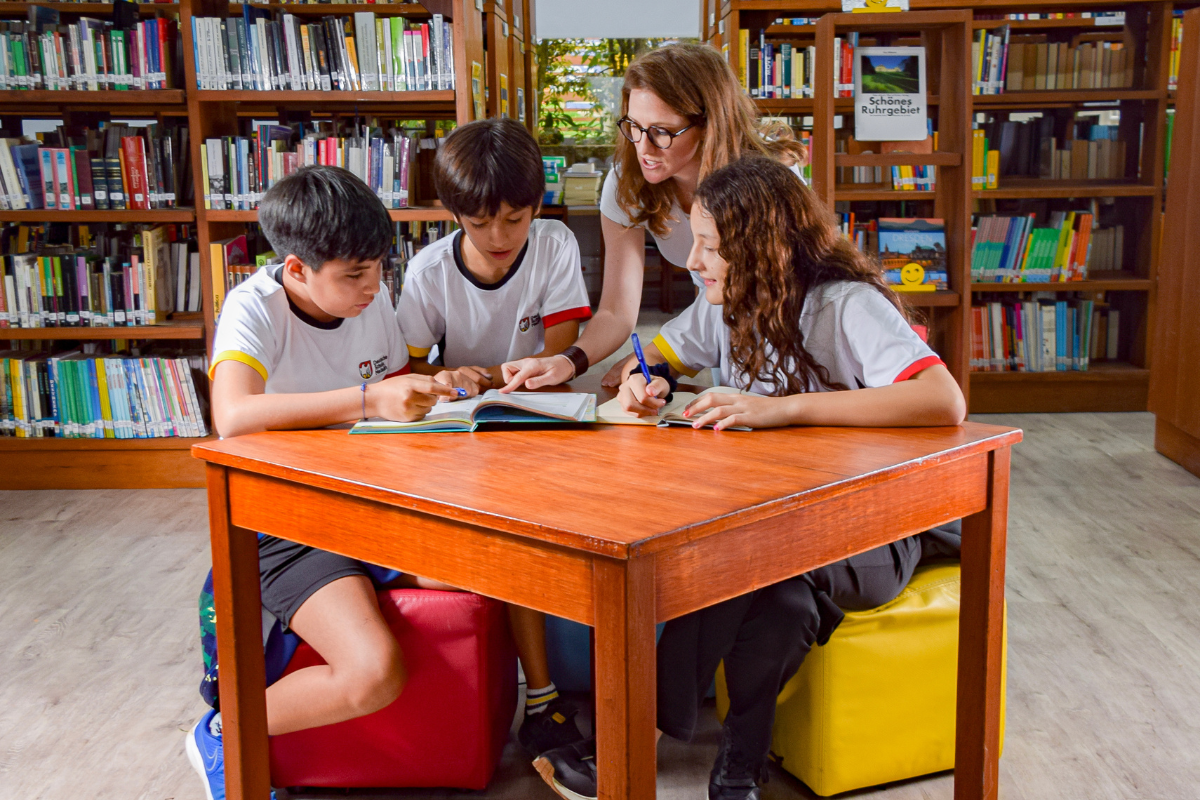Researching to understand the world: the GIB extended essay at the Deutsche Schule Medellín.

In the Bilingual International Baccalaureate (Gemischtsprachiges International Baccalaureate, GIB), each student takes on the challenge of writing an extended essay, an independent research project that tests their curiosity, discipline and ability to think critically. At the Deutsche Schule Medellín (German School Medellín), this process becomes a formative experience that transcends the classroom and strengthens young people's preparation for the challenges of university life.
What is the GIB Extended Essay, and why is it so important?
The IB Extended Essay is a research paper of up to 4,000 words that each student develops over two years with the support of a supervisor; a teacher or administrative staff member at the school. More than a requirement, it is an opportunity for students to take on the role of researchers, ask relevant questions about reality, and consolidate their learning to build knowledge with rigour and autonomy.
Melissa Vickers, the Extended Essay coordinator, says, "This process teaches them to take risks, to start without having all the answers, to make mistakes and to correct them. Many commence with one idea and end up with a completely different one, and in that journey they discover what research really means”. That guided freedom is at the heart of learning. “They learn to organise themselves, manage their time, make decisions and understand that mistakes also teach lessons. The school supports this process through reflection sessions and partial submissions that allow them to constantly build, review and improve," she adds.
Read also: What is the International Baccalaureate?
What do students discover?
Each extended essay reflects a personal concern. The topics are as diverse as their authors: art, biology, global politics, literature, among others.
We spoke with several students in Klasse 12, and this is what they told us: Isabella Vargas explored visual harmony in the architecture of the Palma Pitón restaurant in Medellín, while Simón Castro analysed how the concentration of carotenoids in spinach varies depending on the cooking method. In English, Emma Velasco studied the figurative language in The Devil Wears Prada to question the labour stigmas of the fashion industry.
Jorge Arroyave chose music as his starting point, he analysed how Venezuelan rapper Canserbero addresses the impact of revenge in the perpetuation of violence. “I learned to ask myself questions and find answers, not in the easiest way, but by drawing my own conclusions. That exercise of thinking without guidance was what made the biggest impression on me”, he explains.
For each of them, the learning goes beyond the content. “The most important thing is time management”, says Emma. "It sounds obvious, but you can't do it in a week. There are partial submissions, consultations, and pauses. I learned to organize myself and enjoy the process".
Simón recalls the frustration of the first experiments in the laboratory, “It doesn't always work out as you expect it. But that's where the value lies: repeating, adjusting, and understanding why something doesn't work”.
Carlota Muñoz, who researched the impact of tourism on the city, highlights another type of growth. “I feel that this work allowed me to develop my own knowledge. It makes you a more cultured and critical person when faced with reality”.
How do the administrative team supervisors observe the development of the extended essay?
Carlos Cabrera, Head of Human Resources and one of the supervisors, describes the support provided by some of the administrative staff to students during the preparation of their extended essay as follows: "It is a link with the heart of what we do at the school. Getting to know the students from an academic perspective is very enriching. They face university-level questions, real dilemmas about conflicts, human rights or the environment, without falling into ideologies but rather from their own lived experience”.
For Carolina Marín, Head of Communications and also a supervisor, the process is a two-way learning experience: “We accompany them from our professional experience, but it also refreshes us to see how students think, how they question the world. The structure of the extended essay is demanding, but it gives them tools they will always use; researching, arguing, supporting an idea with evidence”.
What skills remain for the future?
In addition to academic results, the extended essay seeks to cultivate curiosity, resilience and the ability to communicate complex ideas. Students learn to filter sources, propose hypotheses, reformulate questions and, above all, develop their own thinking.
As Melissa Vickers explains, “It's the moment when everything learned in class is applied to a real-life situation. Classes provide the context; the extended essay provides the action. In a world where information is already available everywhere, the value lies in knowing how to interpret it, relate it and make sense of it”.
The process also builds confidence. Emma says that writing her paper entirely in English confirmed that she can take on studies in another country. Isabella found a direct connection to her future career: Product Design. And Carlota saw her research as a way to explore her interest in law and sociology.
Why does this process make a difference?
The GIB extended essay at DSM (German School Medellín) is more than just a graduation project, it is an experience that teaches critical thinking, how to organize what you know and how to approach research as a way of understanding the world. In Melissa's words, “Discovery comes from error, and understanding comes from curiosity”.
The commitment with academic excellence and critical thinking is an essential part of the GIB profile at the Deutsche Schule Medellín. Each year new generations of GIB students embark on and navigate the path of the extended essay, transforming their questions into knowledge.